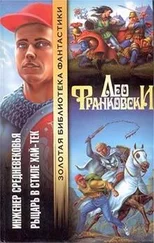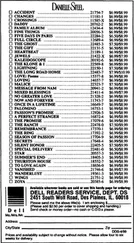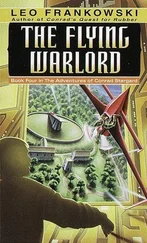Лео Франковски - The High-Tech Knight
Здесь есть возможность читать онлайн «Лео Франковски - The High-Tech Knight» весь текст электронной книги совершенно бесплатно (целиком полную версию без сокращений). В некоторых случаях можно слушать аудио, скачать через торрент в формате fb2 и присутствует краткое содержание. ISBN: , Жанр: Альтернативная история, на английском языке. Описание произведения, (предисловие) а так же отзывы посетителей доступны на портале библиотеки ЛибКат.
- Название:The High-Tech Knight
- Автор:
- Жанр:
- Год:неизвестен
- ISBN:0-345-32763-2
- Рейтинг книги:4 / 5. Голосов: 1
-
Избранное:Добавить в избранное
- Отзывы:
-
Ваша оценка:
- 80
- 1
- 2
- 3
- 4
- 5
The High-Tech Knight: краткое содержание, описание и аннотация
Предлагаем к чтению аннотацию, описание, краткое содержание или предисловие (зависит от того, что написал сам автор книги «The High-Tech Knight»). Если вы не нашли необходимую информацию о книге — напишите в комментариях, мы постараемся отыскать её.
The High-Tech Knight — читать онлайн бесплатно полную книгу (весь текст) целиком
Ниже представлен текст книги, разбитый по страницам. Система сохранения места последней прочитанной страницы, позволяет с удобством читать онлайн бесплатно книгу «The High-Tech Knight», без необходимости каждый раз заново искать на чём Вы остановились. Поставьте закладку, и сможете в любой момент перейти на страницу, на которой закончили чтение.
Интервал:
Закладка:
"So you're saying that you have a bad strain of yeast going. How much beer are we talking about?"
"This was the big barrel, my lord. More than six thousand gallons."
"Ouch! That's a lot of beer. Look-don't dump the barrel. There's something we can do with that beer. It tastes bad, but it still has alcohol in it. There's a process called distillation that will let us save the alcohol."
"This alcohol, my lord. What is it good for?"
"Drinking, mostly, but it has other uses. It's good on cuts and wounds and helps keep them from festering. It's useful in making other things like perfumes and medicines. It's a good preservative and keeps things from rotting. But mostly it's for drinking."
"This sounds wondrous, my lord. And we could do this distillation here at the inn?"
"Here or at the brass works. I'll go over there and see what I can come up with in the way of a still."
We had two big brass kettles that were made for washing wool at Count Lambert's cloth factory, but not yet delivered to him. They each had a tight-fitting lid.
For distillation, you need a container to simmer the mash, or in this case the beer. You contain the vapors and cool them down so that they can liquefy. This is traditionally done with a coil of copper tubing, which we didn't have. But the only important thing is to have enough surface area to provide cooling.
I took one of the kettles and set it up over an outdoor fireplace in the inn's courtyard. I found a hefty length of cast brass pipe intended for the washline that was as long as I was tall. I set the second kettle in a washtub that distance from the first. Then I got a smith from the brass works to solder the pipe between the two kettles, near the top.
This involved punching holes in my liege lord's new kettles, but he probably wouldn't notice. If he did, I could probably think up a good reason why I put the holes there on purpose. Engineers all develop a certain skill at snow jobs.
I also had the smith put a hole in each of the lids so we could check the liquid level in the kettles with a stick. Some thick leather made a good enough gasket for the lids. Sandbags held them down tight and wooden plugs took care of the holes in the lids.
By midafternoon, we had a still that any moonshiner would be proud of.
With the help of one of the cooks, I put forty gallons of bad beer in the boiler kettle and got a fire going under it. We filled the washtub around the condenser kettle with cool water and sat back to watch it work. By dark the level in the boiler had gone down about ten percent and I figured that we'd gotten all that we were going to get.
Sure enough, there were about four gallons of clear liquid in the bottom of the condenser. I took a pitcher of it into the inn and told the cook to put the rest into a barrel someplace. What was left in the boiler could be fed to the pigs.
Tadeusz was eagerly awaiting the results of our efforts. The thought of a new drink fascinated him.
You see, there were very few things to drink in the Middle Ages. There was wine that had to be imported. There was beer that was flat for lack of any container that could hold pressure. There was water that often wasn't safe to drink. There was milk that was only available in the spring and summer. And that was all. Nothing else existed with which a person could quench his thirst.
He looked with great anticipation at the pitcher in my hand, and broke out his two best (and only) glass goblets. Glass was rare and fabulously expensive. They were the only bits of glass at the inn, reserved for the bride and groom at wedding feasts. The other guests at the head table had to make do with silver.
I poured two fingers worth into each glass and we drank.
It was raw and rough and rugged. Wicked stuff. I once tried the product of an Appalachian moonshiner and while my results weren't quite as bad as his, I came close.
Tadeusz was literally cross-eyed. I'd heard of people having that reaction, but I'd never seen anyone actually do it before. There were beads of sweat on his forehead and his breathing had stopped. I had to pat him on the back to get it going again.
Once he was something like normal again, he wheezed, "Sir Conrad. Do your people actually drink that?"
"Well, something like it. I think it needs aging."
"God in heaven, but yours must be a tough people."
"Not really," I said. I held the lip of my goblet to the lamp on the table. The dregs burned vigorously and that meant that it was over fifty percent alcohol.
Tadeusz stared aghast at the burning drink, shook his head and walked away.
It took the cook over a month to process the entire six thousand gallons of bad beer. In the end, we had six hundred gallons of white lightning (I couldn't in justice call this stuff whiskey), which was stored in oak barrels in the inn's basement. On rare occasions, some adventurous buck would ask for a mug of it, but I don't think anybody asked twice. I kept a bottle for use as an antiseptic for my medical kit.
Part of my deal with my liege lord Count Lambert was that I was to return to Okoitz once a month to oversee the construction we had going on there. The first month was up and I had to go.
The problem was that the girls naturally wanted to go along and pay a visit to their families and friends. The count had given me the girls, and probably my lands as well, because they had started imitating the manners of the nobility rather than acting like dumb peasants. He 'felt that it was all my fault and maybe it was.
But he wanted them out of Okoitz before everybody started acting uppity. To bring the girls back would not have been wise. But the girls didn't know that they had been thrown out of their home and I didn't have the heart to tell them.
To make matters worse, Sir Vladimir insisted on coming with me. I had no right to tell him what he could do or not do, and I didn't want to offend the guy. I liked him and I could see where he could be very useful in the future.
Finally, Sir Gregor came to my rescue by suggesting that he and his brothers take the girls on a hunt on my new land before I "ruined" it with a lot of buildings. It only took an hour to talk the girls into it. I mean, I might be the girls' protector, but I wasn't their chaperon. They knew the score. It wasn't as if they were virgins.
FROM THE AUTOBIOGRAPHY OF SIR VLADIMIR CHARNETSKI
Sir Conrad and I arrived at Okoitz to find Vitold, Count Lambert's carpenter, installing the sails on the windmill that was being constructed in the bailey.
This windmill was a huge affair and the top of the turret was higher than the roof of the church. The blades went much higher and the topmost of the twelve was so tall that I think one could stack ten peasant huts one above another and not reach the height of it.
The windmill was surrounded by a circular workshed and it was on the roof of this that the carpenter worked. Count Lambert and six of his knights were also on the roof watching. Perforce, we climbed up to join them.
"Greetings, Sir Conrad," Count Lambert said. "I see that you have brought the excellent Sir Vladimir with you. You see? It's nearly done."
"There's been more progress that I had expected, my lord," Sir Conrad said.
"My people have worked at little else since they finished spring planting. I'll wager that you think better of them now than you did at the Christmas party."
"No bet, my lord. Not on that subject anyway."
"Yes, there is our wager as to whether or not this mill will work, isn't there? Twenty-three thousand pence, wasn't it? It seems you're gaining on me."
"We'll know soon, my lord. The mill looks about done," Sir Conrad said.
"Only on the outside, my lords," Vitold said. "I don't have the pumps and cams all hooked up yet inside and she's got to be way out of balance."
Читать дальшеИнтервал:
Закладка:
Похожие книги на «The High-Tech Knight»
Представляем Вашему вниманию похожие книги на «The High-Tech Knight» списком для выбора. Мы отобрали схожую по названию и смыслу литературу в надежде предоставить читателям больше вариантов отыскать новые, интересные, ещё непрочитанные произведения.
Обсуждение, отзывы о книге «The High-Tech Knight» и просто собственные мнения читателей. Оставьте ваши комментарии, напишите, что Вы думаете о произведении, его смысле или главных героях. Укажите что конкретно понравилось, а что нет, и почему Вы так считаете.










